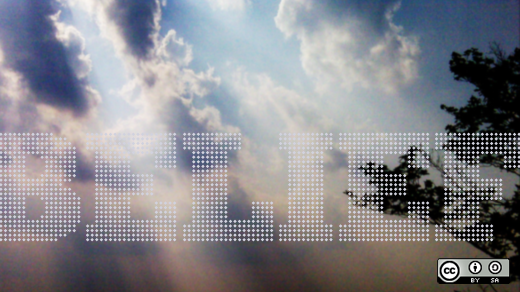We’ve accepted the obvious benefits of open source principles in business and education, law and healthcare. Openness, transparency, and knowledge-sharing helps more people prosper more quickly. We theorize that it can work in any endeavor where communal information needs to be collected, shared, and maintained. In the Life channel, we get to examine some of the less-obvious avenues where open source is found--and here is one that even surprises us a little: open source religion.
A reader tossed us a link to opensourcecatholic.com. This of course raised the question--which Google happily answered: Is there an intersection between open source and religion? 8,910,000 results[1] say yes. Whether you have a church home, a home church[2], or simply some spiritual foundation that you hold to because you believe it, it’s likely that this faith is helped by fellowship, and educated through both doctrine and some form of social networking. What you believe--the specifics of it at least--is usually information that needs to be explored, maintained, and perhaps shared.
Sound familiar? Modern churches--especially in the United States--operate quite efficiently, and take advantage (some are early adopters) of information technology. They may broadcast or webcast sermons, and offer consultation, prayer, or calendar-sharing over the Internet. Many worship leaders--following the same trends public speakers have recognized--give slide-based multimedia presentations from something more like a stage than an old-fashioned pulpit. Some of them use open source technology to do so.
Religion, after all, has the same end-goal as any aspiring creative. A worship leader wants their works to reach as many people as possible. Locking that information down and keeping it sacred among a small flock does not aid in the spread of salvation. The nature of salvation, and the role of proselytizing, does of course widely vary--but we are operating with the general assumption that the majority of religions (like the majority of creatives) do desire to reach out to their believers, those known and perhaps those yet unknown as well.
Another benefit of the open source way? Greater reach--the ability to stretch over geographies or other divides, to congregate with others, even if you maintain the most corner-case minority opinion or belief. Though a large portion of the religious material online is from the ‘major’ theological options--Christianity, Islam, Hinduism, Buddhism, and Chinese traditional (which includes Confucianism and Taoism)--you’ll also find the web host to a lot (and we mean a LOT) of information from and about comparatively tiny religions--many of whom flourish in an online medium.
Open communication, anonymity, and modern technology combine to allow even tiny sects to spread the word. As with real-world religious establishments, some are genuine and some are not. Believers are left to determine validity for themselves, given the information they can find.
The broadly termed pagan community--adherents to various incarnations of ‘old religions’ claiming religious branches of ancient trees--has always particularly embraced technology. A vast majority of the works and words of pagan ritual are collaborative in nature, open in intent--and assembled from recollection or by necessity. The size and spread of the belief meant that established, proprietary texts aren’t really available. Yet, now they are. Sites like Witchvox, which has been publishing since 1997, were up and running with active contributors, long before anybody in the enterprise had heard the word ‘blog.’ And Witchvox authors retain copyright to their work, and can use the license they choose. A later religious collective, The Modern Pagan publishes using Creative Commons (BY-NC-ND) licensing.
Some groups go even further--Aleister Crowley probably would appreciate the Open Source Order of the Golden Dawn (OSOGD, for short), a sub-sect of his sub-sect of the sort-of original Hermetic Order of the Golden Dawn. From the OSOGD website FAQs:
Q: Why call yourselves "Open Source Order"? That seems like a technical name instead of an esoteric one.
A: First, we make no separation between the technical and the esoteric. Similarly, many of our members make no separation between the categories of the 'sacred' and the 'profane'. We use the term in harmony with the Open Source software movement and learn from its experiences.
Q: Open Source Software has a certification process to rate compliance with what is defined as "Open Source". Does the OSOGD have any kind of similar system for certifying a temple or solo practitioner as "Open Source"?
A: The 'open source-edness' of a group is evident in its practices and in how it communicates with the larger community. Since this is easily determined by the observer, there is no need for certification nor the 'power over' politics that it would evoke.
The OSOGD isn’t the only religion with an obvious open source affiliation. The Huffington Post claimed Hinduism is the open source religion, though they might need to consult with the modern and humorous Way of Yo, which lays claim to the title of “World’s First Open Source Religion” (it says so right on their website). Other religions--though not explicitly claiming openness (or, in some cases, that they are a religion at all)--are obvious collaborative, creative, mystical inventions with a heavy dose of liberating technology.
One of the Internet’s earliest memes came in the form of one Bob Dobbs, the representative of the tongue-wedged-firmly-in-cheek Church of the Subgenius. A later entrant (also heavy on the humor and skepticism) is the Church of the Flying Spaghetti Monster.
Some religions, just like some institutions or areas of business--Scientologists, Mormons, government agencies, I’m thinking of you here--may find open source approaches a bit unnerving. After all, those are organizations whose upper echelons operate in secret, where worshippers must undertake some official spiritual and practical experience in order to become informed enough to ascend to leadership--blessed, as it were. And that is quite the opposite of the ‘open source way.’
The Church of Scientology, in particular, seems to suffer from its proprietary way of thinking--at the hands of a rather forced kind of open sourcing. Vast quantities of online effort go into actively refuting or even denouncing Scientolgist beliefs and practices--up to and including publishing what are claimed to be the secret, closely-protected religious documents of the group’s inner orders. Anti-Scientologist website Operation Clambake presents an equal yet opposite view of a religious organization that is very technology-savvy and new-media friendly. Though the Church of Scientology has a massive website, replete with cutting-edge videos and presentations, their foundation--their doctrine--is clearly very proprietary. Beginners buy-in in book form or in person. The information they offer publicly and freely is quite limited. This un-free knowledge is the very thing that a group like Clambake takes advantage of.
And so it goes--the upside to open source is the same as the downside--when everyone can see, anyone can contribute. In discussions of code, there is often no “one true way.” With open source as a process, it sometimes requires more work to collaborate than to dictate.
So too, it seems, for religion. But regardless of your spiritual truth, there is some aspect of it, somewhere, that speaks open source. And if there’s not now? It’s likely there will be in the future.
[1] Granted, a large number of the search returns are about open source “religion” as a movement within technology. But a surprisingly healthy chunk are not--including many of the top-ranked results. Subsequent searches of specific religions like “open source Christianity” or “open source Judaism” also turned up plenty of material.
[2] Church, mosque, temple, sanctum, holy place--whatever you wish to call it, the place or state in which you practice your religion. We make no assumptions by referring to it as ‘church,’ it’s simply a term of familiar use.
ADDITIONAL RESOURCES
Wikipedia: Open source religion: https://en.wikipedia.org/wiki/Open_source_religion
Open Source Religion: https://www.opensourcereligion.net/
Specific faiths:
- Open source Catholic: https://www.opensourcecatholic.com/
- The Open Source Order of the Golden Dawn: https://www.osogd.org/
- The Way of Yo: https://www.yoism.org/
- The Church of the Subgenius (Bob Dobbs): https://www.subgenius.com/
Reference materials (religious books, writings, tools, or apps):
- eSword (“the Sword of the LORD with an electronic edge,” Christianity): https://www.e-sword.net/
- BibleTime (open source Bible app, Christianity): https://bibletime.info/
- Christian Classics Ethereal Library: https://www.ccel.org/
- Open Source Haggadah (Judaism): https://www.opensourcehaggadah.com/aboutus.php
- Build A Prayer (Judaism): https://buildaprayer.org/
- The Open Siddue Project (Judaism): https://opensiddur.org/
- Zekr Qur’an (“Never Profit Off The Prophet,” Islam) https://zekr.org/quran/en/quran-for-linux
- Open Quran (GPL’ed Quran reader/reference/study tool, site is multilingual, Islam) https://openquran.de/
Blogs:
- Religion Online: https://www.religion-online.org/
- Christians in Open Source Software (blog w/ project posts): https://christianoss.org/
- Linux for Christians: https://www.linuxforchristians.org/
Linux distros:
- Ubuntu Christian Edition: https://ubuntuce.com/
- Sabily (Islam): https://www.sabily.org/website/index.php/en/sabily/what-is-sabily
- Zenix (Buddhist): https://zenix-os.net/
- Satanic Ubuntu Linux: https://ubuntusatanic.org/screenshots.php




Comments are closed.